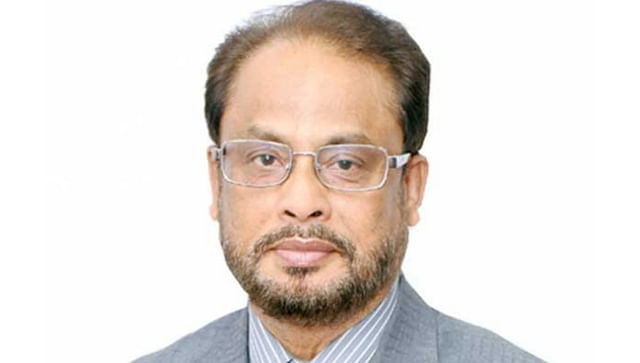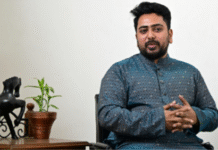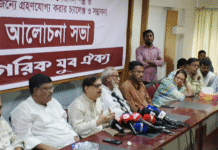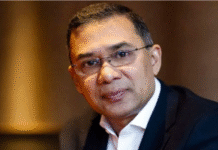
There is general curiosity among political circles concerning how Jatiya Party is faring in its present post-Ershad phase, what political characteristic will it take on and how far it will be able to consolidate its strength. There is a general consensus that the party has not changed much since the demise of its founding chairman HM Ershad. After a flurry of internal fracas and conflict, GM Quader’s leadership in the party has been more or less established. The leaders are also gradually becoming more vocal and outspoken.
Senior leaders within the party say that they want to play an active role in the political arena, keeping in mind their position as main opposition in parliament. However, that is not happening due to various obstacles.
Now, in the absence of Ershad, they are focusing on organising the party nationwide. They are also highlighting the prevailing situation of the country in their speeches and statements. At the same time, they are having to remain cautious about the government’s reaction to their statements and activities.
We feel that a political party must speak out on behalf of the people and earn the trust of the people. Otherwise, what is politics about?
The present chairman of Jatiya Party, GM Quader, speaking to Prothom Alo, said, “We have not seen any reaction from the government so far. And even if we do note any reaction, we will go ahead with whatever we must do. This is not a matter of compromise, though there may be strategic considerations involved.”
Jatiya Party also had its own observations about the government’s development issues. The top leaders of the party have said while the construction of roads, bridges and big buildings is certainly a part of development, actual development involves the improvement of the common people’s living standards. People are still not free of poverty, disparity, political bias, extortion and crime.
Speaking to Prothom Alo, Jatiya Party’s secretary general Ziauddin Ahmed Bablu said, “We feel that a political party must speak out on behalf of the people and earn the trust of the people. Otherwise, what is politics about?”
However, Jatiya Party has not displayed any effective role so far in parliament or in the parliamentary committees. It has opposed the government in certain instances, but at the end of the day it remains in favour of the government.
On paper the party was supposed to play an effective role as opposition in the 10th and 11th parliament, but in actuality, this has been a matter of compromise.
That is why despite being an ally of the ruling party, it is obliged to make all sorts of statements in order to consolidate its image as the opposition. At the same time it also has to be vocal in its criticism of BNP
Transparency International Bangladesh (TIB) published a research report on the parliament proceedings, ‘Parliament Watch’. Referring to the role of Jatiya Party, the TIB executive director Iftekharuzzaman told Prothom Alo that Jatiya Party had an identity crisis in the 10th Jatiya Sangsad (national parliament). They were both in the government and in the opposition. But in the present parliament they are officially in the opposition. They themselves were not sure that they would be in the opposition bench. The confusion of being the opposition in these two parliaments may have cleared, but it is a lot like chopping off the head to cure the headache.
Leaders at the policymaking level in Jatiya Party feel that the election that will take place three years hence in 2023, will not be on the lines of the 2014 or 2018 elections. That is why the party is focusing on a change in political circumstances and also on the next parliamentary polls. The party is also adopting strategies to retain its position as the main opposition in parliament as well as to ensure it remains close to power under any changed scenario.
At a meeting of the party on Wednesday, GM Quader remarked, BNP’s uncompromising leader has compromised and come out of jail. And the party’s leaders and activists do not have any confidence in the other leader (Tarique Rahman). The Jatiya Party leadership is making such comments in order to portray that BNP, weighed down with frustration and failure, has no political future. Ershad would make similar negative remarks about BNP when he was alive.
Anisul Islam Mahmud was made the party’s senior co-chairman and he played a role in getting the government’s nod to place Ziauddin Ahmed in the office of Jatiya Party secretary general. These two have all along pulled strings in the party
Rowshan remains silent
Jatiya Party saw an immediate polarisation upon the demise of Ershad, with his wife Rowshan Ershad on one side and brother GM Quader on the other. That is no longer visible. Aging and ailing, Rowshan Ershad no longer bothers so much about party matters. She is reportedly satisfied to have been able to accommodate son Rahgir Al Mahi Saad Ershad in a good position in the party. Winning a seat in parliament from Ershad’s constituency in Rangpur, he is now joint secretary general of the party.
Saad Ershad, speaking to Prothom Alo, said, “The party is not doing badly. I speak to my uncle (GM Quader). He is ready to cooperate in any way in the interests of the party.”
In the tussle between Rowshan Ershad and GM Quader for the position of party chairman following the death of Ershad, Anisul Islam Mahmud and some others sided with Rowshan Ershad. Ziauddin Ahmed Bablu later mediated an understanding. Anisul Islam Mahmud was made the party’s senior co-chairman and he played a role in getting the government’s nod to place Ziauddin Ahmed in the office of Jatiya Party secretary general. These two have all along pulled strings in the party.
Senior leaders have stepped up their activities within the party. However, former secretary general ABM Ruhul Amin Howladar and some other important leaders, remain silent.
GM Quader told Prothom Alo firmly, “The party is united. We are proceeding ahead together. There is no conflict within the leadership.”
Jatiya Party leaders say that many inactive elements within the party are being dropped. Even certain long-standing employees who have been serving at the Banani office of the party, are being released. The party’s top leadership is not paying attention to organising the party at the grassroots. To this end, eight organisational teams were formed, headed by eight joint secretaries general. They have begun touring the districts.
Jatiya Party has 77 organisational districts of which full-fledged committees have been formed in 46. The others have convening committees. Councils are being prepared to be held in the organisational districts where the terms of the committees have expired.
* This report appeared in the print and online editions of Prothom Alo and has been rewritten for the English edition by Ayesha Kabir









